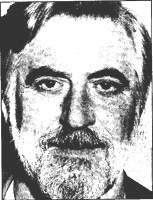|

|
The
Catholic journalist Norman Cresswell was a bigot, miser and grump.
That at least was how he described himself, in a self-penned obituary,
shortly before his death.
Cresswell will be remembered for the two
newspapers which he founded. The first, the Catholic Pictorial, is a
local weekly in his native Mersey side. The second, The Catholic Times, is
a national broadsheet, which Cresswell came out of retirement to launch in
1993. He was immensely proud of the successes of both papers. |
Cresswell
led a varied life. On leaving the Benedictine-run Belmont Abbey School in
Hereford, aged 17, he had lied about his age and enlisted in the Palestine
Police, where his responsibilities included acting as bodyguard for the future
King Hussein of Jordan. On his return to the UK in 1948, he drifted through a
variety of jobs including taxi-driver, private detective, travelling theatre
owner, director of a news agency, teacher and broadcaster. After a time as a
reporter with the BBC in Birmingham, and in industrial publishing, he launched
his first religious paper The Weekly Pictorial, for the Church of England in the
West Midlands. He subsequently launched the Birmingham Catholic
Pictorial, and
was then encouraged to launch another Catholic Pictorial in Liverpool by the
city's then Archbishop John Carmel Heenan.
In
his "auto-obituary" he wrote that his decision to move into religious
journalism ensured... a life of poverty only alleviated by occasional bouts of
simony. At the end of his life he frequently expressed surprise that he had
managed to buy so much whisky with so little talent. In fact the Catholic
Pictorial - still going strong - became an institution in Catholic Liverpool. He
retired from "the Pie" in 1991 but was persuaded put of retirement in
1993 by Gabriel Communications, publishers of the national weekly tabloid
newspaper The Universe. The company wanted him to launch a broadsheet paper
aimed at Catholic traditionalists.
It was felt by the Gabriel board that the other weekly Catholic paper, The
Catholic Herald, followed a liberal, post-Vatican II agenda. The new paper
pledged obedience to the Pope; its masthead bore the "crossed keys"
Vatican motif and the legend "Follow Peter".
The resources he had to launch me paper were minimal. He had only
one reporter and a few freelance contributors. His office - more of a cubby hole
- just about had room for his battered old typewriter and the clouds of tobacco
smoke from his pipe. It was tucked away in a comer of the advertising sales
department to ensure that Cresswell kept his distance from the staff of The
Universe, who considered the new paper a threat. Cresswell packed his paper with
hard-hitting, right-wing commentators. The paper took an aggressively
anti-abortion stance, and was more supportive of the Vatican than any of the
other Catholic papers then on the market. It was even, one commentator
suggested, more papist than the Pope. (If imitation is truly the sincerest form
of flattery then Cresswell would have been flattered by the lurch towards the
right in subsequent years of The Catholic Herald.)
Colleagues were never sure to what extent Cresswell himself subscribed to
the extreme and hard-line views which he published. While generally Supportive
of Catholic teaching, he had, perhaps, a more generous understanding of the
fallibility of human nature than some of the Vatican figures which his paper
lauded. Certainly he understood, and occasionally pandered to, his readership.
The letters page of the paper became the sounding-off board of choice for a host
of reactionary Catholics, who bemoaned modern hymns, priests who failed to wear
clerical dress, or the hundred and one other faults (as they saw them) of the
Roman Catholic Church in England and Wales. Although popular with its target
audience, the paper was, in its early years, heartily disliked by many of the
Catholic hierarchy, much to Cresswell's delight. After his retirement from
the paper in 1996, he continued to contribute a column, "View from the
Pew", in which he contemplated the mysteries of the Catholic Church from a
lay standpoint - or maybe that should be kneelpoint. In one of his last columns
in the Catholic Times he informed readers - almost apologetically - that he was
terminally ill. "It seems to me the height of bad manners to just disappear
one day without farewell or thanks for your patience with me over the
years," he wrote. He wanted, he said,
" to say adieu whilst I still have some ability to think coherently. That
said, I promise you I'll not have the bad manners, in however many columns are
left me, to leave you with a recital of the woes inherent upon packing for a
long journey."
He did, however, use his final columns to remind his readers of the strength,
inspiration and courage he received from his faith. Catholicism, he said
recently, was a "culture inbred in the bone". He was concerned, in the
last weeks of his life, that no one would turn up at his funeral, and tried to
ensure what he described as a "quorum" by promising that the wine
would flow and that his wife, Mary, would not be doing the cooking. Cresswell
need not have worried. His funeral Mass was packed. He was buried with his pipe,
which in life he was rarely without,
and wearing the habit of the Franciscan order, to which he had always
felt a particular affinity. In a letter written shortly before his death, he
urged friends to "bombard with prayers the gates of Heaven where
a disreputable old hack will soon be trying to con his way in".
Norman William Cresswell, journalist: born Rock Ferry, Cheshire
2 September 1928; owner and editor, Industrial News Service, Birmingham 1955-60; owner) Catholic Pictorial .1961-88, Editor 1961 -91; owner,
Mersey Mirror Ltd 1971-88; Editor, Catholic Times 1993-96; married 1965 Mary Rooney (two sons); died Little Crosby, Merseyside
PAULINUS
BARNES
13 August 2001.
